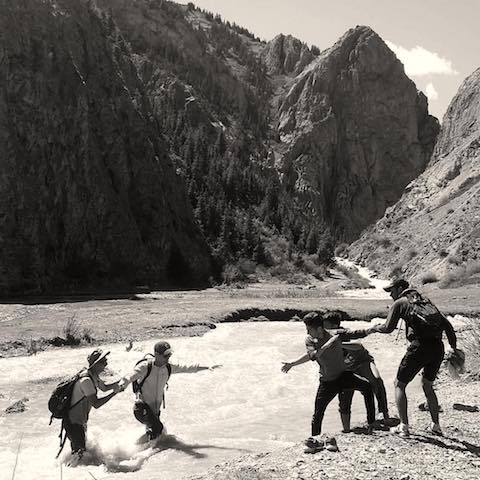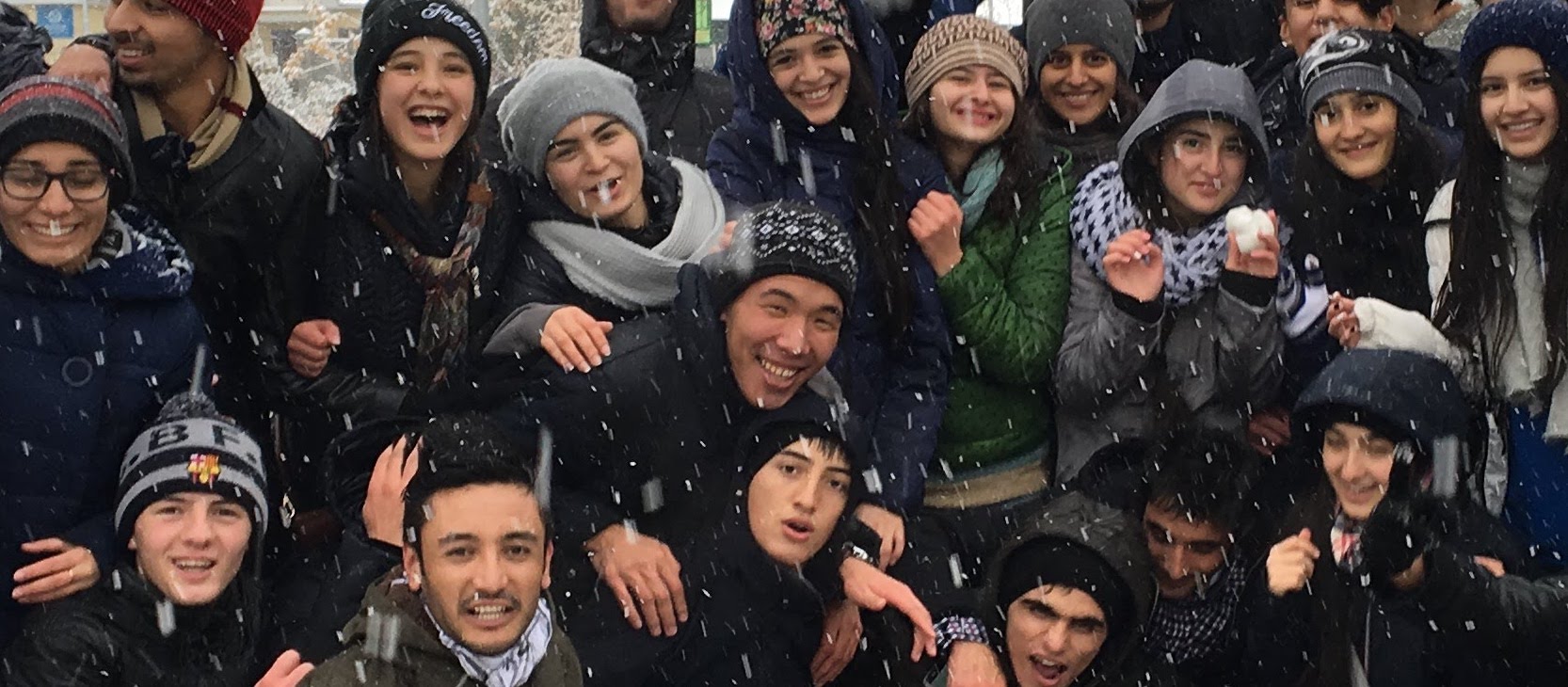I believe that Temirkhan Turgunbaev’s first name means “Iron King”. It is a fitting name for a young man who possessed a will of iron. Even among a group of talented, generally-motivated young students, Temirkhan displayed an unusual drive in his academics and was constant in his quest toward improving himself. He had an enviable level of self-discipline – even though he was a passionate person (Temirkhan loved to recognize special moments; with the utmost gravity and seriousness, he would often give speeches on independence days or school-wide celebrations when he felt that something ought to be remembered) he almost never lost control of his emotions. While other students gathered in the dormitory lounges to watch movies or played video games, he was usually hard at work.
Temirkhan was a reader. He spoke with great pride about Chingiz Aitmatov, Kyrgyzstan’s most famous writer. When we talked about Dostoyevsky and great Russian-language literature, he insisted that I must read Pushkin, for his amazing poetry and for bringing Russian writing into modernity. True to the personality of many readers, Temirkhan was always after clever tidbits of information and arcane pieces of knowledge– the hacks that improve daily living, even if only by a little.
This sometimes led to misguided efforts, but always in the most endearing way. I remember as I was tutoring math one evening, Temirkhan excitedly confided in me that he had found a series of YouTube videos that taught mental math and that this was going to really help him improve his performance in math class. I was skeptical and told him that we still needed to work on other things (like the concepts in the homework due later that week), but I also didn’t have the heart to totally discourage him because of his earnestness. When I discussed this newfound interest in mental math with his professor, I discovered that Temirkhan had also alerted him to the new grade-booster scheme. With a slight sigh, Mr. Kholiknazar agreed that while Temirkhan was never the best math student, his dedication and work ethic was indeed very admirable.
Yet, ambition and resolve only partially captures his person. He had a very pure heart and if there was ever anyone who was the polar opposite of sarcastic and cynical, it was Temirkhan. His sincerity and good nature was refreshing amidst some of the turbulence that year at the University of Central Asia. We shared many good moments. I remember wandering through the stalls of the Naryn Bazaar with him toward the end of the first semester so that I could buy a traditional kalpak with a design appropriate to my age and status (we got one for a young, unmarried man). I remember winning our campus scavenger hunt with him on our team; all of us crammed into a taxi headed into town so we could videotape ourselves finding various food and clothing items. I remember coaching him on how to dribble a basketball and which leg to jump off of while shooting a layup. And I remember that one time we walked the halls of campus, chuckling as we pretended to engage in conversation for a promotional video.
Temirkhan understood what living urgently meant. On the rare occasion he wasn’t in good spirits, he often was frustrated by his current academic progress or nervous about his personal development. I think back to what was for me, our most personal interaction - a late night conversation at an old Soviet resort along the clear waters of the southern shore of Issyk-Kul. It was spring break and late into the second semester. With the students remaining on campus, several staff took two buses up to Kyrgyzstan’s largest and most sacred lake. We arrived to find that we were perhaps two or three weeks too early into the season– it was far too cold to be in the small, uninsulated wooden cabins furnished with old springy mattresses and outdoor toilets and showers.
I think it was the second chilly night, as I performed my nightly patrol to check up on the students, that I saw him standing alone outside his cabin, bundled up in his jacket. I think I might have been mildly annoyed as I walked up to him on that concrete path, dimly lit by lamps powered on a backup gas generator. That particular night had a dreariness that made me wish I could go to bed as soon as possible.
The look on Temirkhan’s face, however, was disarming. He explained he felt very worried that he was too far behind and he had too much to learn. “Please advise me” he asked, like he always said, only this time more urgently. He worried that his English wasn’t good enough and that he hadn’t improved it enough over the course of the year. He wished he had more friends and that he was better at interacting with the other students. And he wasn’t sure if studying Economics was the right thing to do and what job he could get with it afterwards. He shared the enormous responsibility he felt for his single mother and his brother. His desire was to provide for them so that they’d all be comfortable.
Though we must have paced the same 15 meters back and forth a hundred times during the couple hours we spoke, I can no longer remember the patterns of the red and grey concrete bricks. And I honestly can’t remember my exact advice that night. It was probably a variation of the usual thing – continuing to put in the work, getting out there and talking to people, finding a passion and doing related personal projects, and finally trusting in steady progress. I do remember, however, that I truly believed that Temirkhan would succeed. I was extremely excited to see his progress in the years following graduation and I couldn’t wait for him to become the provider that he wanted to be to his family.
There’s a place called Arslanbob, one of the largest walnut forests in the world. Temirkhan would insist that if anyone was ever around his hometown of Jalal-Abad, they had to go see it for themselves. Some legends claim the forest was accidentally planted by Alexander the Great when his soldiers dropped the nuts as they wandered through. Others claim that it was Silk Road traders or even a disciple of the Prophet Muhammad. I’d like to think Arslanbob really was the work of Alexander, the young ruler who wept when he was told that the number of worlds was infinite. Temirkhan Turgunbaev was a lover of knowledge, a young man ambitious for the welfare of others, and the another king who left the earth too soon. May the seeds of kindness and unity that Temirkhan planted into those around him forest and outlast us all.

